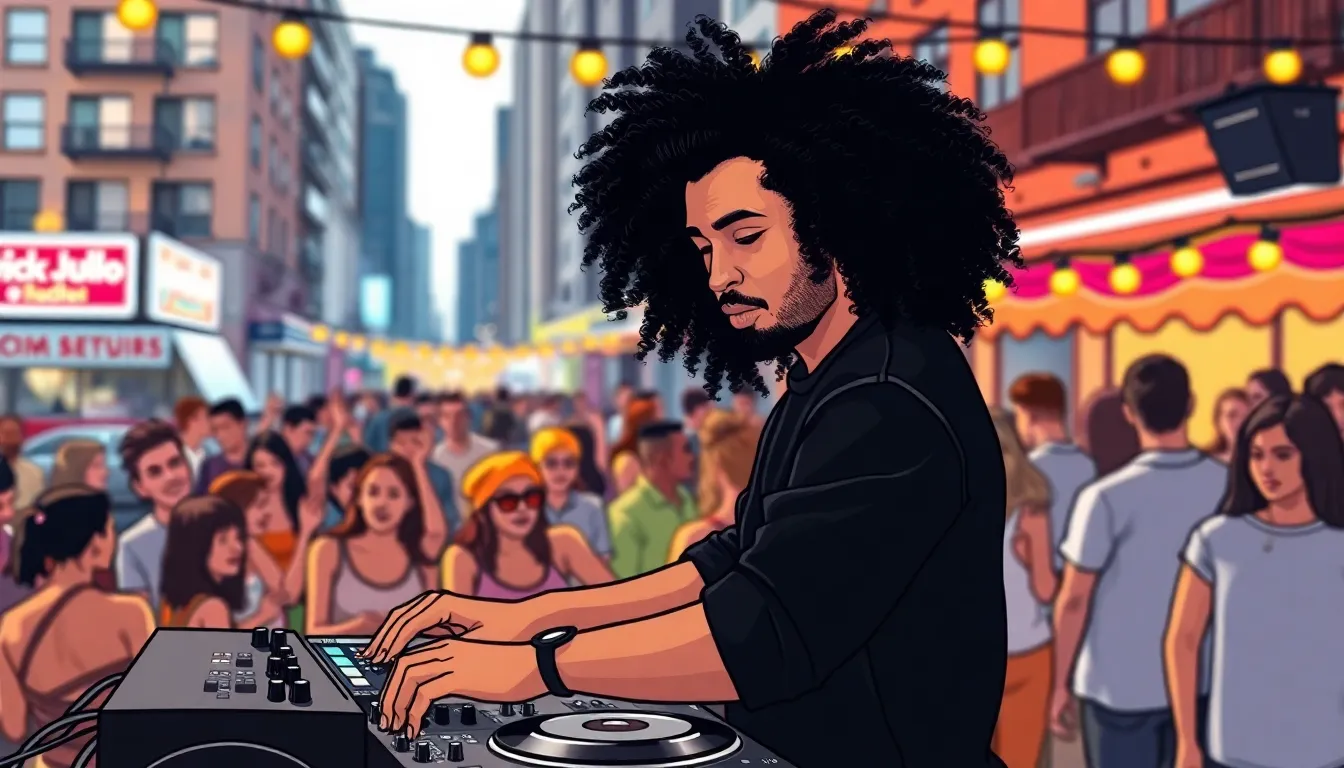Hip-hop playlists are the secret sauce to elevating any mood or occasion. Whether you’re vibing solo, hosting a party, or just trying to impress that special someone, the right mix of beats can turn any situation into a memorable experience. From old-school legends to today’s hottest stars, these playlists capture the essence of the culture and keep the energy flowing.
Table of Contents
ToggleOverview of Hip-Hop Playlists
Hip-hop playlists offer curated selections that cater to a variety of moods and occasions. These collections transform experiences, enhancing personal enjoyment during workouts or social gatherings. Featuring a mix of classic and contemporary artists, they reflect the genre’s evolution and cultural significance.
Playlists often highlight upbeat tracks for celebrations, providing an energetic atmosphere. They also include slower beats for reflective moments, showcasing the genre’s lyrical depth. Incorporating various subgenres, such as trap, boom bap, or alternative hip-hop, adds richness and variety to the listening experience.
Engagement with playlists occurs across platforms like Spotify and Apple Music, where users create and share their favorite tracks. Top playlists often contain songs that trend on charts, representing what captivates audiences at any given time. Regular updates keep selections fresh, enticing listeners to explore new artists and sounds.
Listeners appreciate the convenience of playlists as they help discover hidden gems alongside mainstream hits. Engaging with curated hip-hop playlists fosters a deeper connection to the music and culture. Additions to playlists can introduce styles or messages that resonate, ensuring ongoing relevance and enjoyment.
Overall, hip-hop playlists serve as a powerful tool for expression and connection. They embrace not only the sounds of the genre but also the stories behind the artists and their messages. Through carefully crafted selections, playlists empower listeners to navigate their emotions and social experiences.
The Evolution of Hip-Hop Playlists

The evolution of hip-hop playlists reflects the genre’s rich history and dynamic nature. Over the years, various influences shaped how playlists are created and enjoyed.
Early Influences
The origins of hip-hop playlists trace back to the genre’s roots in the late 1970s. Pioneers like DJ Kool Herc laid the groundwork by blending tracks and creating energizing mixes for parties. Curated selections became essential for setting the mood in community gatherings and celebrations. Block parties in urban neighborhoods showcased the innovative spirit of these early DJs. Street culture, graffiti art, and breakdancing intertwined with music selections, fueling the movement’s growth and permanence. As hip-hop gained traction, mixtapes emerged, highlighting emerging artists and underground sounds. These influential compilations introduced audiences to new talent while establishing communal experiences.
Technological Advancements
With the rise of technology, hip-hop playlists underwent significant transformations. The introduction of Mixcloud and SoundCloud changed how fans accessed music and shared curated collections. Streaming services like Spotify and Apple Music revolutionized playlist creation, enabling quick updates and user-generated content. Algorithmic recommendations personalize the listening experience, connecting fans to both mainstream hits and emerging artists. Digital platforms allowed for global reach, broadening exposure for diverse styles within hip-hop. Mobile devices simplified access, allowing playlists to accompany listeners anytime, anywhere. This technological landscape fostered a culture of collaboration, where artists and curators engage directly with fans through curated playlists. Overall, advancements shaped a vibrant ecosystem for musical exploration.
Popular Hip-Hop Playlists Today
Hip-hop playlists play a significant role in the music landscape, showcasing both curated selections and algorithm-generated tracks.
Curated vs. Algorithm-Generated
Curated playlists feature carefully selected songs by knowledgeable music enthusiasts or experts. These playlists often reflect specific themes or moods, providing a tailored listening experience. Algorithm-generated playlists, however, rely on user data and listening habits to create dynamic collections. These playlists adapt to listeners’ preferences in real time, offering fresh content based on trends. Combining both curated and algorithm-generated playlists enhances the overall listening experience, allowing fans to discover new tracks while enjoying familiar favorites.
Notable Playlists on Streaming Platforms
On Spotify, “RapCaviar” stands out, focusing on current hits and emerging artists in hip-hop. “Most Necessary” caters to fans looking for trending tracks and underground gems. Apple Music hosts “The A-List: Hip-Hop,” showcasing industry staples and popular new releases. Tidal features “Tidal’s Best of Hip-Hop,” highlighting critically acclaimed tracks and albums. These playlists not only enrich the hip-hop experience but also allow listeners to engage with diverse sounds and styles within the genre.
Impact of Hip-Hop Playlists on Artists
Hip-hop playlists significantly influence the exposure and discovery of emerging artists. Curated collections on platforms like Spotify and Apple Music often spotlight up-and-coming talents alongside established names. These playlists create opportunities for lesser-known artists to gain a following. They also enhance visibility in a competitive landscape, where emerging songs can organically attract new listeners.
Additionally, playlists contribute to a more diverse appreciation of hip-hop. By featuring tracks from various subgenres, listeners encounter innovative sounds that broaden their musical horizons. This discovery process empowers both artists and fans, cultivating a deeper connection to the culture.
Exposure and Discovery
Exposure plays a crucial role in artists’ careers, where playlists act as powerful promotional tools. Music enthusiasts frequently turn to popular playlists for fresh sounds, leading to increased streams and social media engagement. Niche playlists focusing on specific themes or moods also capture listeners’ attention, enabling artists to reach targeted audiences. Many artists credit playlist placements with substantial boosts in their monthly listeners, establishing a direct link between playlist inclusion and career growth.
Discovery thrives on the algorithmic recommendations provided by streaming services. Algorithms analyze listening habits, presenting artists that might have otherwise gone unnoticed. As a result, new talents find a place in users’ playlists, often resulting in fans exploring their entire discography.
Trends in Music Consumption
Trends in music consumption show a shift towards streaming and playlist-centric listening experiences. Data indicates that over 80% of music is consumed via streaming services, indicating a clear preference for playlists over traditional album formats. Shorter songs often align with listeners’ attention spans, with many releases under three minutes. This trend supports the creation of more curated playlists, as listeners seek quick access to catchy tracks.
Moreover, playlists facilitate social sharing and community building. Fans often share their favorite playlists, leading to organic promotion of featured artists. The engagement created through playlists leads to a cycle of continued interest, where artists can cultivate dedicated fanbases while navigating the evolving landscape of hip-hop music.
Hip-hop playlists are more than just collections of songs; they’re a reflection of culture and emotion. They enhance experiences whether during workouts, social gatherings, or quiet moments of reflection. By blending classic tracks with contemporary hits, these playlists keep the genre alive and evolving.
The digital age has revolutionized how fans access and share hip-hop music. Platforms like Spotify and Apple Music allow for personalized listening experiences, making it easier to discover new artists and sounds. As playlists continue to shape the music landscape, they empower listeners and artists alike, fostering deeper connections within the hip-hop community.



